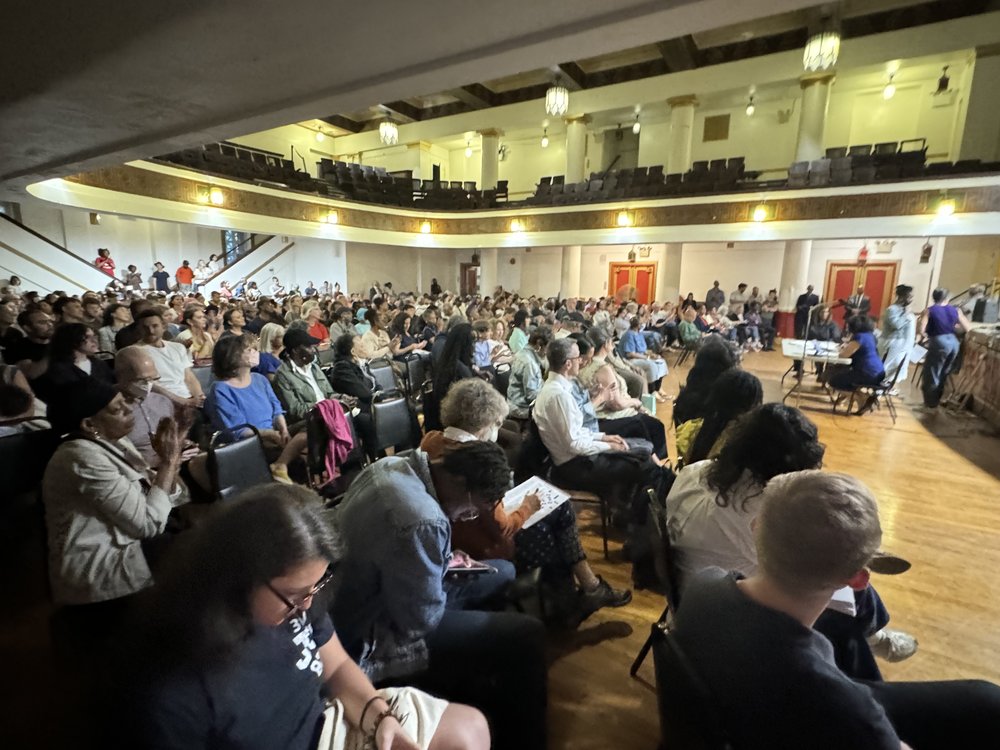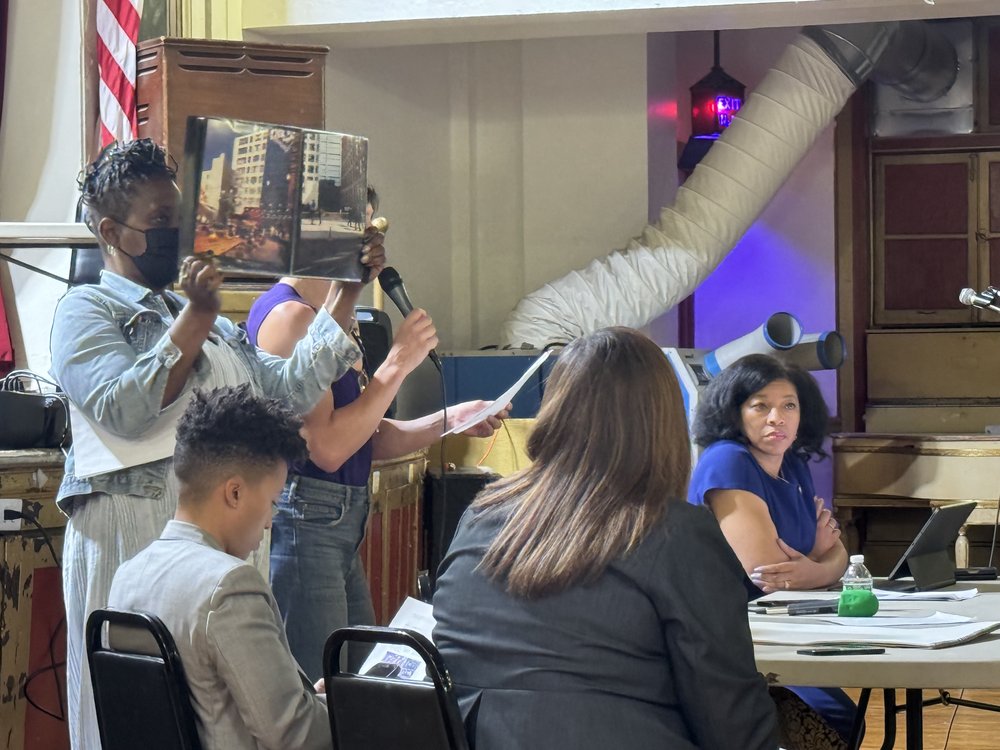Brooklyn neighbors irked over migrant shelters gain a powerful new ally
June 4, 2024, 6:30 a.m.
Attorney General Tish James pledges to do "whatever I can" to help address her Clinton Hill neighbors’ complaints over migrant shelters.

Clinton Hill residents raising quality-of-life concerns about the mega-shelters for migrants in their Brooklyn neighborhood have a new ally: New York State Attorney General Letitia James.
James, who lives near the Hall Street-area shelters and once represented the neighborhood in City Council, has pledged to do “whatever I can in my capacity" to pursue her neighbors’ concerns, which range from loitering to extra trash. The pledge came in a town hall at the Brooklyn Masonic Temple, packed with hundreds of attendees, most voicing complaints about large shelters housing nearly 4,000 migrants.
“My role will be to oversee all of this,” James told the Friday night gathering, noting that complaints have reached her at the supermarket, laundry, and even during church. “And to make sure that the needs of this community are met, and that elected officials are responsive to all of you, just as I was.”
James added, “I don't want you to have a lot of expectations, again, because of my position…That being said, I may have to step out of my role, and as a private citizen, and do whatever I can to address the issues.”

The promise comes amid escalating worries from neighbors — expressed in public meetings and other forums — about the large-scale shelters in the neighborhood, home to one of the largest concentrations of migrants in the city. The town hall on Friday night, hosted by Renee Collymore, the Democratic liaison for the local state assembly district, follows a similar crowded event early last month.
Residents have complained about migrants’ panhandling nearby local businesses, loitering at a local playground, and littering around the two shelters, home to 3,860 single and migrant families, according to City Hall figures. Some attendees also voiced concerns about poor conditions at the shelters, citing lack of space and poor food. No migrants spoke at Friday’s gathering.
Camille Joseph Varlack, chief of staff to Mayor Eric Adams, told the crowd that the city had ramped up security at the sites — keeping police officers stationed nearby at all hours, installing metal detectors, and implementing curfews — and increased trash collection, among other fixes. She added that she was willing to return “as often as possible” to address their concerns.
“These are difficult issues. Nobody wants this,” Varlack said.
She added, “This is not a crisis of our making. This is a national crisis, and it does require a national response.”
City Hall spokesperson Kayla Mamelak did not respond to a request for comment on James’ offer of support.
Of the community concerns, Mamelak said in a statement: "New Yorkers are understandably frustrated with bearing the brunt of this national humanitarian crisis, and we’re frustrated too…While we agree that housing thousands of individuals in large sites is not ideal, as we have said repeatedly, we have been out of viable options for months now — especially as hundreds of additional migrants continue to arrive every single week asking for shelter.”
The Clinton Hill shelters constitute the “largest concentration of migrants outside of Randall’s Island,” NYPD Assistant Chief Scott Henderson told hundreds of residents who told a town hall meeting on the issue in early May, according to the news site THE CITY. The sites also represent about over an eighth of the pre-existing population of Clinton Hill, which has 28,647 residents, according to the Department of City Planning's analysis of 2020 Census data.
Some residents demanded the city shut down the shelters, and instead replace them with smaller sites.
“I want to stress that this is not about the asylum-seekers. It is about the shelter size,” said Alia McKee Martinez, a local resident. “My heart breaks for those seeking a better life who find themselves trapped in what many have told us feels like a prison.”
Martinez said immediate action is necessary ahead of the expiration of the current lease for one of the sites, at 47 Hall St., in March. The current contract for the site includes a clause for a seven-year extension, she said.
"This plea is not NIMBY. I am speaking with my conscience against the practice of mass warehousing thousands of people," she said.
Varlack, Adams’ chief of staff, said that the administration is working to shrink its “extremely large” shelter sites. “But it does take time,” she said.
Some attendees asked for more resources for asylum-seekers in shelters, and sanitation and safety resources to address neighbors’ concerns. Others called for more intervention from federal elected officials.
And then there was James. The attorney general suggested the creation of several local committees for residents, including for English language instruction and legal help, following requests from neighbors calling for more organization.
Local resident Terri Little said she was concerned about the influx of migrants putting a strain on local resources, like police, sanitation, and schools. More than 200,000 have come through the city in an influx that began two years ago.
“Charity starts at home,” Little told the crowd. “Wanting to help people is admirable, yet you cannot feed others if your stomach isn’t full.”
Notably in attendance was local Councilmember Crystal Hudson, who faced criticism for her absence at a previous town hall on the issue. Hudson apologized for missing the prior meeting in early May, citing a conflict – a meeting with residents who had been displaced by a building fire.
Hudson said her priority is for the city to provide more resources to asylum-seekers living in shelters, such as interpretation services, and to address neighbors’ concerns.
Hudson said she wrote to the mayor, asking him to co-host a town hall with her to specifically address residents' concerns. Hudson said the mayor refused to do so and instead only agreed to host a general meeting to address a range of issues in the neighborhood, she said. The mayor’s office did not respond to a request for comment about Hudson’s invitation.
Hudson is hosting a separate “community briefing” on the shelters on June 17, from 6 p.m. to 8 p.m. The location has yet to be finalized, Hudson said, but it’ll take place in the district.
“I just have to say it plainly, there's politics and there's people….I'm one who puts people over politics,” Hudson told the crowd. She added: “He needs to come and answer to you all as well.”
Migrants' budding tent encampment under the BQE in Brooklyn dismantled by city officials For some migrants in NYC, a tent encampment under the BQE is now home For migrants in NY, stays in some city shelters have hit rock bottom, advocates say Where did the migrants who left NYC’s shelter system go?